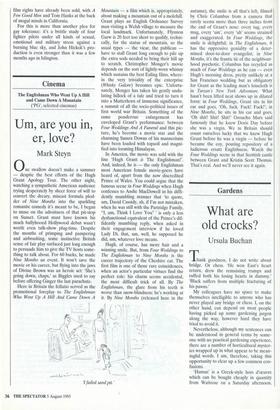Cinema
The Englishman Who Went Up A Hill and Came Down A Mountain ('PG', selected cinemas)
Urn, are you in, er, love?
Mark Steyn
One swallow doesn't make a summer — despite the best efforts of the Hugh Grant Apology Tour. The other night, watching a sympathetic American audience trying desperately by sheer force of will to convert the dreary, miscast formula plod- der of Nine Months into the sparkling romantic comedy it's meant to be, I began to muse on the adroitness of that pit-stop on Sunset. Grant must have known his much ballyhooed Hollywood debut wasn't worth even talk-show plug-time. Despite the months of primping and pampering and airbrushing, some instinctive British sense of fair play surfaced just long enough to persuade him to give the TV hosts some- thing to talk about. For 60 bucks, he made Nine Months an event. It won't save the movie or his career, but flying into the jaws of Divine Brown was an heroic act: 'She's going down, chaps,' as Biggles used to say before offering Ginger the last parachute.
Here in Britain the fellatio served as the promotional foreplay to The Englishman Who Went Up A Hill And Came Down A Mountain — a film which is, appropriately, about making a mountain out of a molehill. Grant plays an English Ordnance Survey man visiting a Welsh village to measure the local landmark. Unfortunately, Ffynnon Garw is 20 feet too short to qualify, techni- cally, for the status of mountain, so the usual types — the vicar, the publican — have to stall Grant long enough to pile up the extra sods needed to bring their hill up to scratch. Christopher Monger's movie depends on the sort of lightly-worn whimsy which sustains the best Ealing films, where- in the very triviality of the enterprise (Whisky Galore) becomes epic. Unfortu- nately, Monger has taken his gently undu- lating hillock of a tale and tried to turn it into a Matterhorn of immense significance, a summit of all the socio-political issues of first world war Britain. Something of the same ponderous enlargement has enveloped Grant's performance: between Four Weddings And A Funeral and this pic- ture, he's become a movie star and the charming Sussex Downs of his mannerisms have been loaded with topsoil and magni- fied into looming Himalayas.
In America, the movie was sold with the line 'Hugh Grant is The Englishman!'. And, indeed, he is — the only Englishman most American female movie-goers have heard of, apart from the now discredited Prince of Wales. You could argue that the famous scene in Four Weddings when Hugh confesses to Andie MacDowell in his diffi- dently mumbling manner that 'to quote, um, David Cassidy, ah, if I'm not mistaken, when he was still with the Partridge Family, "I, um, Think I Love You"' is only a less dysfunctional equivalent of the Prince's dif- fidently mumbling reply, when asked in their engagement interview if he loved Lady Di, that, urn, well, he supposed he did, um, whatever love means.
Hugh, of course, has more hair and a winning smile. But, from Four Weddings to The Englishman to Nine Months is the career trajectory of the Cheshire cat. The first film is one of those rare coincidences, when an actor's particular virtues find the perfect role: his charm seems accidental, the most difficult trick of all. By The Englishman, the glare from his teeth is worse than snow-blindness: he's working at it. By Nine Months (released here in the failed sand pit.' autumn), the smile is all that's left, filmed by Chris Columbus from a camera that rarely seems more than three inches from the end of Grant's nose: every tug, every mug, every 'urn', every 'A' seems strained and exaggerated. In Four Weddings, the smile is delightful; in The Englishman, it has the oppressive geniality of a deter- mined door-to-door evangelist; in Nine Months, it's the frantic tic of the neighbour- hood psychotic. Columbus has recycled as much of Four Weddings as he can — even Hugh's morning dress, pretty unlikely at a San Francisco wedding but as obligatory for Grant as the leading man's loincloth is in Tarzan's New York Adventure. What hasn't been lifted neat shows up in diluted form: in Four Weddings, Grant sits in his car and goes, 'Oh, fuck. Fuck! Fuck!'; in Nine Months, he sits in his car and goes, `Oh shit! Shit! Shit!' Groucho Marx said famously that he knew Doris Day before she was a virgin. We in Britain should count ourselves lucky that we knew Hugh Grant before he was a virgin — before he became the coy, pouting repository of a ludicrous ersatz Englishness. Watch the Four Weddings scene in that Scottish castle between Grant and Kristin Scott Thomas. That's real. And we'll never see it again.


















































 Previous page
Previous page